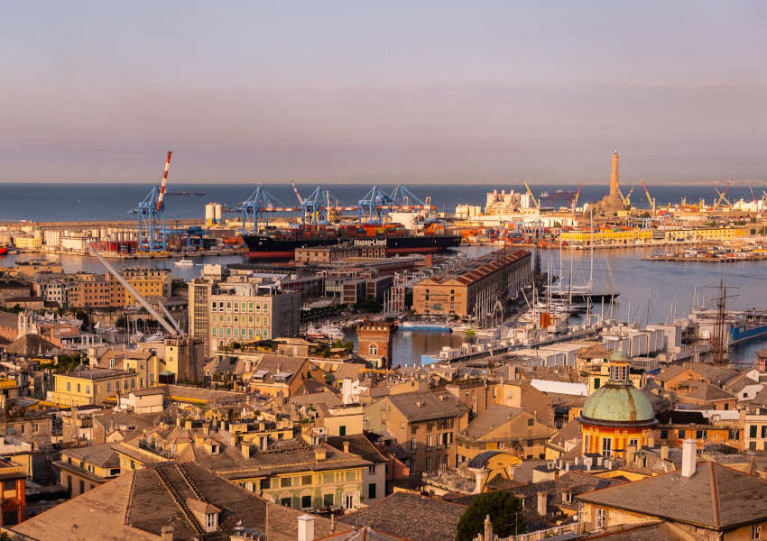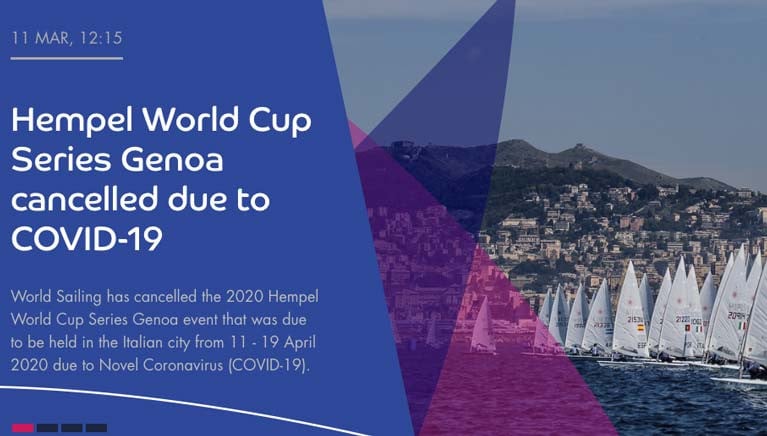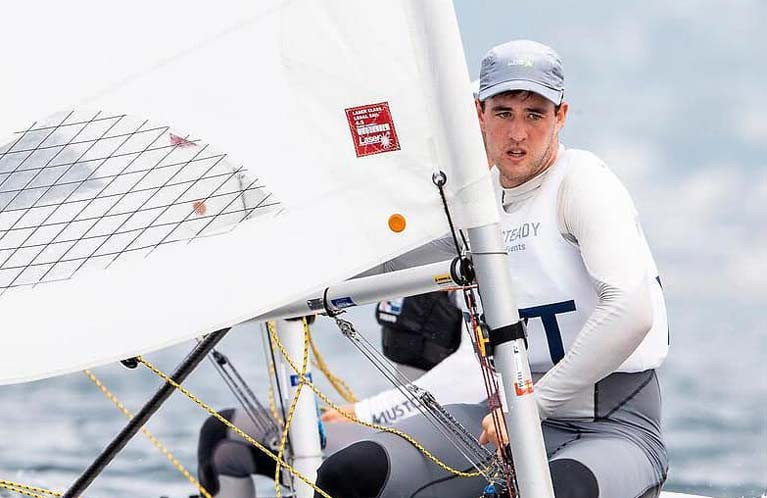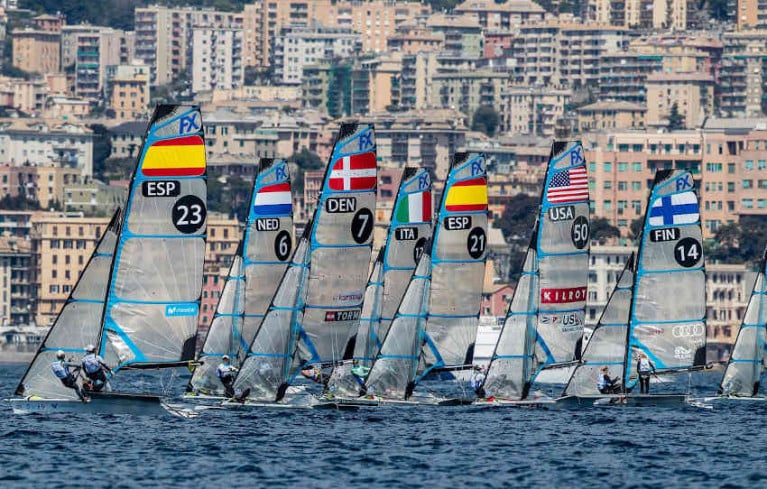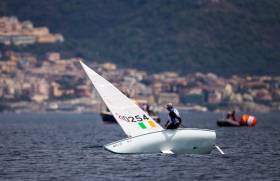Displaying items by tag: Genoa
Legends of The Ocean Race Invited to Celebrate 50th Anniversary in Genoa
The Italian port city of Genoa, host of The Grand Finale of the next edition of The Ocean Race, will see a distinguished line-up of race legends come together to celebrate the 50th anniversary of the race.
All boats and sailors who have previously competed in the race are invited to participate in the Legends festivities, organisers say.
The Legends regatta will be part of the host city activities during the finish to the 14th edition of The Ocean Race at the end of June 2023.
Born as the Whitbread Round the World Race in 1973 and continuing as the Volvo Ocean Race from 2001 through 2018, The Ocean Race has become the reference fully crewed around-the-world race in the sport of sailing.
For the past 50 years, the race has been a proving ground for the best sailors, yacht designers and builders in the sport, creating five decades of icons and legends.
Over the coming year, The Ocean Race will celebrate its heritage by having race legends at stopover events, promoting historical content in race programming, through a capsule merchandise collection and a virtual legends race — all building towards the on-site Legends event in Genova.
“We are so excited to share the history of The Ocean Race here in Genova, as part of the Grand Finale celebrations this summer,” said race chairman Richard Brisius at the ‘Towards The Ocean Race’ event in Genoa this past Sunday (6 November).
“One of our race legends, the late Sir Peter Blake once said this race ‘gets in your blood and you can’t get rid of it’, and I think that is a perfect description of how the challenge of The Ocean Race takes hold of your imagination and doesn’t let go. This is the history we want to honour and celebrate during our 50th anniversary year in 2023.”
Enrique Carlin was watch captain on board his father Ramon’s boat, Sayula II, winner of the inaugural Whitbread Round the World Race in 1973-74. In a message, he said: “Over these past 50 years of The Ocean Race, things have changed a lot; boats and navigation, all of the technology behind the event. The only thing that has never changed is the enthusiasm and love of sailors to be there, sailing on the great ocean with the tempestuous winds and waves. I hope that all of you who have raced around the world can be there on our anniversary this year, at the end of June 2023, to celebrate achieving this wonderful dream of sailing around the world in the greatest competition of them all.”
The ‘Towards The Ocean Race’ event was hosted at the Porto Antico in Genoa on board the Amerigo Vespucci, a tall ship used by the Italian Navy for training purposes. The Amerigo Vespucci is also linked to The Ocean Race, having been on site for previous leg starts and during the recent stop of The Ocean Race Europe.
Among those in attendance were Captain Luigi Romagnoli; Rear Admiral Massimiliano Nannini, director of the Hydrographic Institute of the Navy; Rufino Selva Guerrero, deputy director in thematic projects for the Comunidad Valenciana Society; Laurent Rousseau, business manager of the Race Village of Alicante; Gianmarco Nicoletti, brand manager for Ulysse Nardin in Italy; Antonio Di Natale, marine biologist and consultant of the Genova Process; and the the Mayor of Genoa, Marco Bucci.
“The Ocean Race is an historic appointment for the city of Genova and a significant event for Italy in 2023,” said Mayor Bucci. “We are talking about a sporting event of great value and a worldwide following. The announcement of the Legends regatta is a further, very important step that enriches the Grand Finale program. These will be days of great excitement for our city that will have the eyes of the sailing world focused on us.
“We are ready to host tens of thousands of sailors and guests. It is an opportunity not to be missed and Genova will demonstrate its ambition as a city capable of attracting and hosting international events.”
The Legends event is among a suite of activities Genoa will activate as the official destination marketing partner of The Ocean Race, in addition to its role as host city of The Grand Finale, the finishing leg of 14th edition of The Ocean Race.
Genoa in Italy to Host Finish of The Ocean Race Europe
The first edition of The Ocean Race Europe will finish in Genoa, Italy this June — two years before it does the honours as home of the Grand Finale of the 2022-23 round-the-world race.
Racing will start from Brittany on France’s Atlantic coast at the end of May, with teams racing in stages to the finish in Genoa in the third week of June.
The remaining iconic cities hosting the race will be revealed in turn, organisers stated.
“In The Ocean Race Europe we are realising a dream of many — a race between European cities with engaged fans and athletes achieving the extraordinary while driving change for a healthier planet,” The Ocean Race chairman Richard Brisius said.
“We understand the importance of teamwork, and collectively we back the EU work for green transition, digitalisation and unity.
“Our friends and partners in Genova [Genoa] also really understand the value of the environment in helping to support the economy and well-being of people. We look forward to working together to make The Ocean Race Europe a success.”
Marco Bucci, Mayor of Genoa, added: “We’re proud to host the inaugural edition of The Ocean Race Europe — it is undoubtedly going to be ‘the’ event of the 2021 offshore sailing circuit.
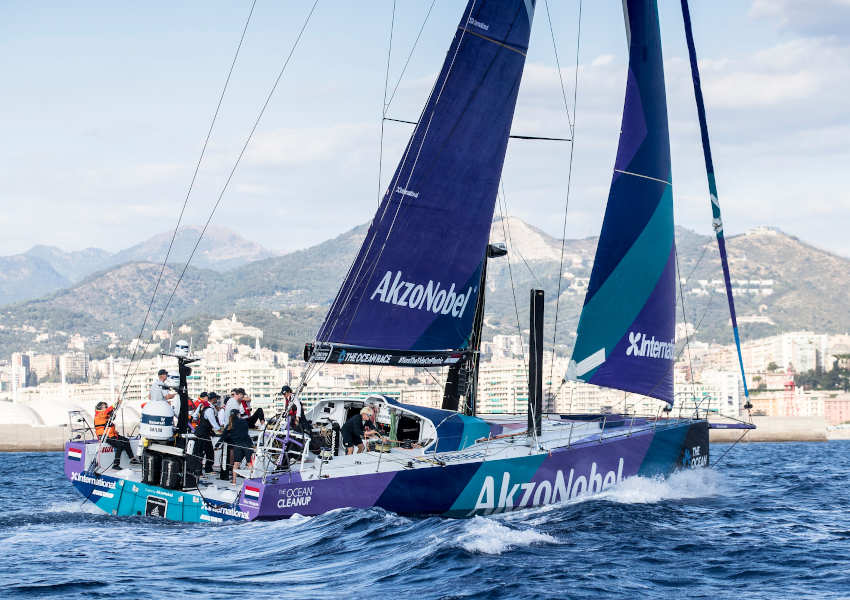 Team AkzoNobel’s VO65 in Genoa for The Ocean Race’s corporate event in September 2019 | Maria Muina/The Ocean Race
Team AkzoNobel’s VO65 in Genoa for The Ocean Race’s corporate event in September 2019 | Maria Muina/The Ocean Race
“Genova will take centre stage, having the opportunity to celebrate its traditions and ambitions, moving towards a future of great international events. Genova can do it — our great facilities make for a perfect venue to host events of this level.
“Furthermore, behind the coastal infrastructure, the city offers a unique artistic and tourism hub, ready to welcome Italian and international fans of our sport, which is now living a golden moment for the public and in the media alike.”
The Ocean Race Europe is open to VO65 and IMOCA class yachts. The VO65 fleet will also participate in The Ocean Race Europe Prologue event starting in the Baltic Sea in early May.
“For the VO65 teams, The Prologue and The Ocean Race Europe itself marks the start of our journey towards The Ocean Race around the world in 2022-23,” said Bouwe Bekking, an eight-time veteran of The Ocean Race.
“Whether we are trialling new crew or equipment, or using the event for fundraising and sponsorship, it’s a critical first step on the road to The Ocean Race and an opportunity for all of us to feel the pull of this great race once again.”
“The Ocean Race Europe will be a good test for our team to compete with other similar boats and a great opportunity to get racing in our IMOCA again,” said Nicolas Troussel, skipper of the CORUM L’Épargne Sailing Team in announcing his entry in the IMOCA fleet last week, which followed Mirpuri Foundation’s official entry in January.
Organisers of The Ocean Race Europe are prioritising the health and safety of all competitors and stakeholders and will follow all relevant regulations and advisories with respect to COVID-19.
Ireland's bid for two further Tokyo Olympic 2020 places will be rescheduled after the cancellation of World Sailing's World Cup Series Genoa event that was due to be held in the Italian city from 11 – 19 April 2020 due to Novel Coronavirus (COVID-19).
As Afloat reported previously, following the outbreak of COVID-19 in Italy, World Sailing has been in regular contact with the Federazione Italiana Vela (FIV), the local organisers, and the Italian Government, receiving updates and closely monitoring the situation.
After a four year journey, Ireland is seeking the final places available in both the men's Laser dinghy and men's 49er skiff classes.
The World Sailing Board has also consulted the World Sailing Medical Commission prior to making this decision.
The decision was made to ensure the health and well-being of the sailors, support personnel, officials and volunteers, a top priority for World Sailing.
Hundreds of sailors, however, continue to arrive on the Spanish island of Mallorca for the Trofeo Trofeo Princesa, another Olympic regatta that takes place this month.
Hempel World Cup Series Genoa was to act as the final opportunity for Tokyo 2020 Olympic qualification for African, Asian and European sailors in a number of the Olympic Sailing Events. The International Olympic Committee (IOC) has granted World Sailing an extension of the qualification period to 30 June 2020.
World Sailing is now working in close collaboration with the IOC and Event Organisers to reschedule the remaining African, Asian and European Tokyo 2020 Olympic qualifiers and to ensure that all quota places can be allocated.
Further updates on qualification events will be issued by World Sailing with formal updates applied to the Tokyo 2020 Olympic Sailing Qualification System here.
All Eyes on Genoa World Sailing Cup as Italy Suspends Sailing Regattas Until April 3rd
All eyes are on the Italian port of Genoa as it prepares to host the important Olympic classes qualifier at the World Cup of Sailing event next month while Italy goes into a period of lockdown over Coronavirus.
This is a problem for top-level competitors from 59 nations either trying to qualify for their national team (like Ireland) or to maintain their competitive edge before the 2020 Games.
As Afloat reported yesterday, the Italian Sailing Federation has suspended all events and competitions on a national basis until April 3rd, just a week before the 1,000-competitor Genoa World Cup event gets underway.
Other international sailing fixtures scheduled for Italy in April have already been scrubbed such as the J24 Europeans Championships.
Irish Sailing’s performance squad has cancelled its planned training base in the northern Italian city and switched to Mallorca in the Balearic Islands instead but even now that might not be enough to stem the virus threat.
"If cancelled, how will the remaining European places for Tokyo 2020 be decided?"
The scheduled Genoa regatta is the final European qualification opportunity for the men’s single-handed and skiff events ahead of Tokyo 2020 and Ireland is desperately seeking those final places in both classes.
The Asian Olympic qualifier has already been switched to Genoa due to Covid-19 concerns but with that potentially affected too the question on everyone's lips is: if cancelled, how will the remaining European places for Tokyo be decided?
And with the latest spread of the virus, it now looks like other early Summer Olympic sailing regattas will be affected too, the most affected being International championships leading up to the Tokyo 2020 Olympic Games at the end of July.
These potentially include:
- 470 World Championships, Palma, Mallorca, 13 March
- Olympic Classes Princess Sofia Regatta, Palma, Mallorca, 27 March
- Olympic Classes Hempel World Cup Series, Genoa, Italy, 12 April
- America's Cup – ACWS Round 1, Cagliari, Italy, 18 April
- 470 European Championships, Hyeres, France, 5 May
- Finn Gold Cup, Palma, Mallorca, 8 May
- RS:X European Championship, Athens, Greece, 10 May
- Nacra 17, 49er, 49erFX European Championships, Malcesine, Italy, 11 May.
World Sailing says it is keeping the situation under constant review while a group of sailors have launched an online petition in the hopes of persuading World Sailing to cancel the upcoming World Cup Series event in Genoa.
The petition states: "It is irresponsible and possibly dangerous to host the Hempel Sailing World Cup in Genoa due to the risks of COVID-19. Having hundreds of sailors, coaches and staff from all over the world stay in Northern Italy and return to their home countries would undue global efforts to contain the virus. It is the responsibility of World Sailing to provide safe events for their competitors".
One of the Irish sailors seeking the last 49er berth is Ryan Seaton from Belfast. He told BBC NI news this week about travelling to Genoa: "The experts have been keeping us up-to-date and if they say it's safe to go we will trust their opinion. If they say it's a no-go they'll have to to look at an alternative location to get the qualifier in."
Sailors Launch Online Petition To Cancel Genoa Olympic Qualifiers Over Coronavirus Risk
A group of sailors have launched an online petition in the hopes of persuading World Sailing to cancel the upcoming World Cup Series event in Genoa due to the risks of COVID-19, particularly in Northern Italy.
Calling themselves Sailors Against Coronavirus, the group — apparently based in Spain — argues that it is “irresponsible and possibly dangerous to host the Hempel Sailing World Cup in Genoa due to the risks of COVID-19”.
They add: “Having hundreds of sailors, coaches and staff from all over the world stay in Northern Italy and return to their home countries would undue global efforts to contain the virus.
“It is the responsibility of World Sailing to provide safe events for their competitors. Many sailing federations are required compete in Genoa to qualify for the Olympics, which forces them to decide between their safety and a chance to compete at the Olympic Games.
“World Sailing should make the responsible decision to cancel the event and chose a safer location for final Olympic qualifications.”
The Hempel Sailing World Cup Series event in Genoa is scheduled to start on Saturday 11 April and is the last chance for Irish sailors to claim a spot at Tokyo 2020.
Finn Lynch Takes Fifth Overall In Thrilling Laser Final In Genoa
In a thrilling medal race final at the Hempel World Sailing Cup Series at Genoa, Finn Lynch from Carlow placed third this afternoon (Sunday 21 April) to claim fifth overall in the men’s single-handed Laser event.
The result marks the third consecutive major regatta for Lynch this year in which he finished in the top 10 of his event in the run-up to Tokyo 2020.
The National Yacht Club sailor entered the medal race final in seventh place overall with the possibility of a silver or bronze medal.
However, it was the sixth-placed Andrew Lewis, from Trinidad, who edged ahead into second place to took bronze, while Hungary’s Jonatan Vadnai placed fifth to win gold, with silver going to Pavlos Kontides who placed eighth in the final. Vadnai’s brother Benjamin won the final race and finished ninth overall.
In fact, any of the 10 finalists were potential medallists and the neck-and-neck race was reflected at the finishing-line with first to last places just 50 metres apart.
As light winds dominated the week at Genoa, so too was the final race sailed in near calm conditions.
“Finn started well, didn’t get into any trouble and sailed to his tactics – a straight race that he executed very well,” said Rory Fitzpatrick, Irish Sailing’s head coach.
“I’m delighted, seeing Finn come through from Toppers to Laser Radial then medalling at Youth Worlds and now contending for medals at senior level is outstanding.”
Ireland has still to qualify in the men’s single-handed Laser event for the Tokyo 2020 Olympics, with the next opportunity at the class world championships at the Olympic venue in Enoshima, Japan this July.



























